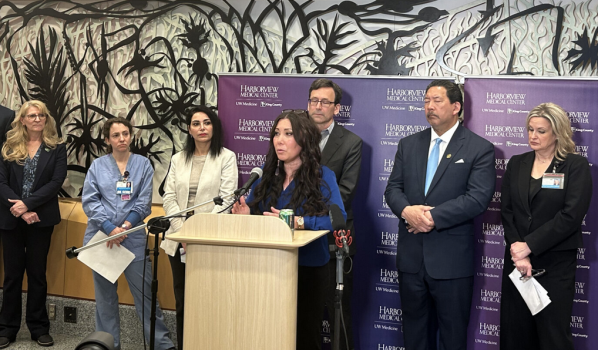What Medicaid cuts passed by U.S. House could mean for WA
Published 9:30 am Wednesday, May 28, 2025
Washington leaders are warning that at least 194,000 people in the state stand to lose Medicaid coverage under a Republican-backed budget bill that passed the U.S. House last week.
In Pacific County, an estimated 5,300 people — including about 1,100 children — currently receive Medicaid coverage through the state’s Apple Health program.
Only nine other states could potentially have more residents lose their health insurance from Medicaid than Washington, according to estimates released by Democrats on Congress’ Joint Economic Committee.
Washington would also lose about $2 billion in federal Medicaid funding over the next four years, Gov. Bob Ferguson said at a press conference at Harborview Medical Center in Seattle. He said “no rainy-day reserve fund is going to backfill that.”
But he stopped short of saying the proposed cuts would necessitate a special legislative session since many of the bill’s provisions wouldn’t go into effect immediately.
The cuts also threaten the livelihood of the state’s nursing homes and rural hospitals, officials said.
“Hospitals will close in Washington state, in rural parts of our state and urban parts of our state,” Ferguson said. “Take that to the bank. That’s going to happen. Nursing homes in our state will close.”
In light of this, about two dozen Washington state Republican lawmakers, including House Minority Leader Drew Stokesbary, pleaded with the 12-member congressional delegation to avoid cuts that would imperil the state’s Apple Health Medicaid program.
“We urge you to protect Medicaid,” they wrote in a letter sent May 21. “We can’t afford to lose local health care resources, and our rural communities will not be able to ride out the economic shockwaves that are sure to follow if this program is significantly cut.”
The letter marked a departure from Republican lawmakers’ tack on federal policy maneuvering, as they’ve largely remained mum on the potential Medicaid cuts and numerous other hot-button topics since President Donald Trump took office in January.
Washington U.S. Rep. Michael Baumgartner, of Spokane, who served previously in the Washington state Senate, took swipes at leaders in Olympia as he touted passage of the House bill.
“Elections have consequences and the contrast between leadership in Washington DC and Washington state is stark,” he wrote in a social media post. He went on to slam Ferguson for signing state laws this week that will raise billions in new taxes and also criticized the governor’s stance on immigration.
“The American people are getting what they voted for,” he added.
Massive bill
The legislation that Republicans in Congress are forging ahead with is sprawling in scope. It would extend tax cuts approved in 2017 during Trump’s first term, pump more money toward border security, rework energy permitting and restructure college aid, among other changes.
To cut spending in line with their desired tax breaks, House Republicans propose reductions between $600 billion to $700 billion over 10 years to Medicaid, according to Congressional Budget Office estimates. The program, which is run jointly by the federal government and states, provides health care for people who are poor or disabled. Roughly a quarter of Washington residents are covered by Medicaid.
The bill squeaked through the House by a single vote, with only Republicans in support. Baumgartner and the other Republican in Washington’s delegation, Dan Newhouse, of Sunnyside, both voted for it.
Newhouse and Baumgartner’s red districts have the highest proportion of Medicaid enrollees in Washington.
In a statement, Newhouse defended his vote, saying Trump’s “big, beautiful bill” would implement “real, common-sense reforms to strengthen the integrity of Medicaid, protecting the program for low-income families, seniors, and those with disabilities.”
One of the key changes the bill proposes is a requirement that certain Medicaid recipients prove they are working to qualify for coverage.
Specifically, the proposal would require childless adults without disabilities to work, volunteer or attend school for 80 hours per month, with some exceptions. Work requirements would go into effect by the end of 2026, up from the initial 2029 meant to give states time to prepare.
Of Washington adults on Medicaid, 70% are working, according to the nonpartisan health research organization KFF.
Democrats have universally decried the legislation, framing it as an attempt by Republicans to pay for tax cuts that will deliver outsized benefits to wealthier taxpayers, while undermining safety net programs for lower-income Americans.
“This legislation is a betrayal of Republicans’ promise to lower costs for everyday families,” said Rep. Suzan DelBene, D-Medina. “It will rip health coverage away from millions of families while increasing groceries, utilities, and health care bills.”
The bill would also punish states like Washington that offer Medicaid-style coverage to immigrants without legal status. Enrollment in Washington’s program for immigrants is capped, and it is funded using only state money.
For states that offer programs like this, House Republicans want to decrease how much the federal government would pay to cover enrollees who qualify for Medicaid under expanded eligibility stemming from the 2010 Affordable Care Act, also known as Obamacare. Hundreds of thousands of Washington adults got Apple Health coverage under that expansion.
Over the next decade, this could shift to the state $10 billion in costs the federal government previously covered, according to KFF.
The legislation still needs to pass the U.S. Senate before reaching the president’s desk.
By way of background
Washington receives over $13 billion in federal funding for Medicaid, according to fiscal year 2023 data from the state Office of Financial Management. The state chips in another $8 billion, one of the largest categories of spending in its operating budget.
As of last month, nearly 2 million Washington residents were enrolled in Apple Health, including over 850,000 children, according to the state Health Care Authority, which oversees the program.
Jen Chong Jewell’s son, Gabriel, is one of them. The Everett 14-year-old has developmental disabilities and has used Medicaid to cover surgeries, therapies and medical equipment.
“I love my son, and I hate that he, along with so many others, are being swept into this narrative about the need to, quote ‘eliminate waste, fraud and abuse,’” Chong Jewell told reporters.
Also looming is the expiration of expanded tax credits for the Affordable Care Act that allowed more people to purchase insurance. That change and others to the federal health care law could cost another 79,000 residents in Washington their coverage, according to the congressional analysis.
Nationwide, this would bring the total to 13.7 million people with lost coverage by 2034.
The bill also would stop coverage for gender-affirming care for transgender people and reproductive care through Planned Parenthood. Washington state Senate Majority Leader Jamie Pedersen, D-Seattle, was among more than 500 legislators across the country who called on congressional leadership this week to preserve Medicaid funding for Planned Parenthood services.
Meanwhile, cuts to federal food stamp benefits — known as the Supplemental Nutrition Assistance Program, or SNAP — would shift $300 million in annual costs to Washington, according to Ferguson’s office.






